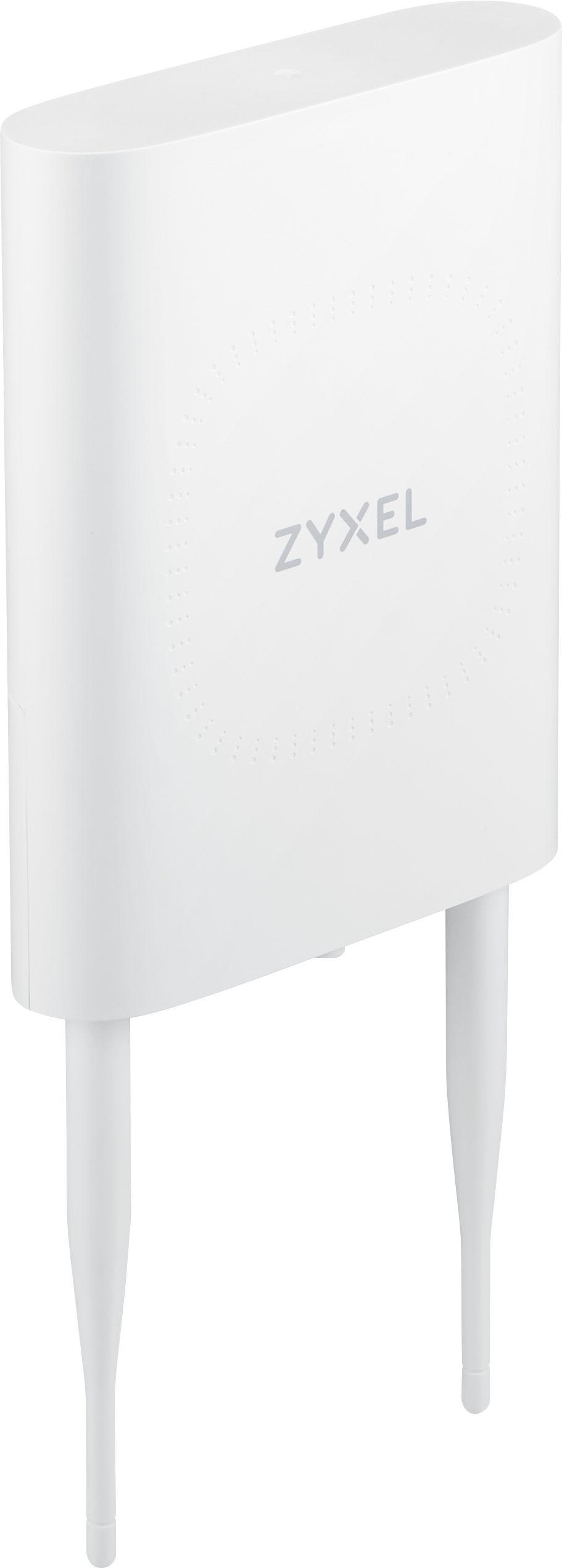Description
H3C WA6120 is a Wi-Fi 6 (802.11ax) access point (AP) individually developed by New H3C Technologies Co., Ltd. (H3C). It can be widely applied to scenarios such as enterprises, schools, and healthcare.
The AP adopts a dual-band and four-stream design with a maximum access rate of 1.775 Gbps. For 5 GHz radio2 spatial streams, the maximum negotiation rate is 1.2 Gbps. For 2.4 GHz radio2 spatial streams, the maximum negotiation rate is 0.575 Gbps.
The AP features flexible installation methods, including panel mounting, wall mounting, and ceiling mounting.
Operating mode
Fit AP mode
The WA6120 supports the Fit AP mode and can be managed by the wireless controller equipped with the Comware system. In this networking mode, the user can locally manage the APs in batches.
Cloud AP mode
WA6120 supports H3C Cloudnet solution that enables wireless networking without hardware AC and authentication server. It can perform authentications via PPSK, PSK, Portal, SMS, and WeChat. Customized development is implemented for multi-branch scenarios such as hotel chains and supermarkets, enabling features such as easy deployment, hierarchical and decentralized management, smart large screen at headquarters, and customized configuration templates. The Cloudnet smart O&M platform enables users to grasp the status of wireless devices, networks, and terminal devices, and allows for simple management and O&M. This helps to reduce customer capital investment and O&M labor costs, and increase efficiency.
WA6120 supports Quicknet local automatic networking solution. Automatic discovery and construction of devices to achieve unified management of multiple devices and ensure network experience by relying on AP intelligent native technology.
Smart O&M
The visualized, measurable, and auto-optimized H3C smart O&M system facilitates operation and maintenance and saves labor costs.
Data visualization
The H3C smart O&M system collects and displays rich O&M data via telemetry techniques. On the terminal side, it records the terminal’s roaming log, authentication log, signal strength, important packet interaction log, packet loss, latency, etc., and can identify over 150 reasons for terminal failures to go online, over 140 reasons for terminals to go offline, and over 100 reasons for authentication failures. On the AP side, it collects data such as AP association failures, reasons for detaching from the AC, traffic composition of each wired interface, error packet information, radio traffic composition, radio channel utilization, radio interference strength, and WIPS wireless attacks.
Measurability
The H3C smart O&M system has established a perfect evaluation system to measure the user experience, device health status, and network status, enabling the administrators to view and maintain the network easily.
Automatic optimization
The changing wireless network, radio environment, services, and user scale require the network to have the ability of automatic issue resolving and network optimization. The H3C smart O&M system features intelligent and progressive optimization. It can identify and analyze network issues automatically, and deliver policies for automatic issue resolving and network optimization. In this way, the network will always have high performance, low interference, and optimal user experience without human interference.
Security protection of wired and wireless networks
Terminal device access and admission security
With the wireless controller, wireless switches, and authentication system self-developed by H3C, WA6120 can support authentication and encryption via 802.1x, PSK, MAC address, PPPoE, Portal, WeChat, and SMS. This ensures network security.
Wireless intrusion prevention system (WIPS)
WA6120 supports WIPS. In combination with the wireless controller/wireless switch, it supports WIPS features such as detection, intrusion detection, as well as blacklist and whitelist of rogue devices at the same time. The WIPS features enable the device to detect, identify, take countermeasures against, and effectively intercept rogue devices.
Wired network security
WA6120 supports wired access and control of APs. The wireless port of APs can be authenticated as an 802.1X client of the wired access network to ensure the legality of the AP. It guarantees the security of the wireless tunnel through encryption methods such as CAPWAP tunnel and DTLS.
Wired network security can be enhanced with the H3C Security Situational Awareness. When the wired terminal detects a security issue in the wireless terminal, a linkage mechanism will be triggered to notify the wireless controller to block the wireless access of the terminal, thereby ensuring network security.
Radio resource optimization and station access control policy
WA6120 supports the radio resource optimization policy (RROP). RROP is a collection of multiple wireless radio optimization methods. It is used to reduce or control the consumption of radio media resources caused by management packets, broadcast packets, and invalid packets. It helps to set aside more resources to provide the users with better wireless application services. RROP mainly contains radio resource optimization policies such as layer 2 isolation for wireless services, disabling low data rate, adjusting the Beacon interval, and disabling the broadcast probe function.
WA6120 supports the station access control policy (SACP), which guides the terminal client to access the optimal AP or wireless service and helps control and schedule the traffic of the terminal devices based on network applications. This improves the overall performance of the entire wireless network and improves the experience and effect of wireless access applications. SACP feature mainly includes terminal control policies such as the prohibition of clients with weak signals, spectrum guide, roaming guide, load sharing, ignorance of packets with weak signals, fair scheduling of radios, traffic shaping based on client link status, and smart bandwidth guarantee.
Radio resource management (RRM)
RRM monitors in real time the environmental conditions such as the utilization rate of radio channels, channel interference, and signal conflict through systematic intelligent radio management. Moreover, it adjusts in real time the radio parameters such as the working channel, bandwidth, and power to maintain optimal radio resource status. In this way, it enables auto network planning and auto network repair.
Roaming optimization
The wireless AP supports the fast BSS transition feature defined in the 802.11r standard that helps to facilitate the roaming of wireless users, reduce the possibility of network interruptions, and enhance roaming quality.
Through the 802.11k mechanism, the AP and the wireless client perform interactive detection and perceive multi-dimensional network topologies. The AC identifies and comprehensively calculates the roaming timing and access location of the wireless client from a full perspective and negotiates switching with the client via the 802.11v and 802.11r mechanisms. During the switching period, the AC will ensure the traffic of the downlink service, to achieve seamless switching and improve user experience.
Only 11ax access
WA6120 supports the only 11ax access feature. The Wi-Fi 6 (802.11ax) is backward-compatible with 802.11a/b/g/n/ac standard, so the users of the 802.11a/b/g/n/ac standard can access a Wi-Fi 6 (802.11ax) wireless access device. However, its compatibility causes a decline in the actual performance of devices with high access capabilities such as Wi-Fi 6 (802.11ax) to some extent. The H3C devices enable the user to set the access mode of a certain radio frequency to only 11ax (only users using Wi-Fi 6 (802.11ax) can access). This ensures bandwidth transmission and device performance.
Orthogonal frequency division multiple access (OFDMA)
WA6120 supports OFDMA technology. An AP can divide wireless bandwidth and transmit data to multiple terminals simultaneously via different subcarriers. This reduces transmission latency caused by multi-user radio resource contention and backoffs and improves the user experience of low-latency applications such as speech output and video in multi-user scenarios.
Spatial reuse (SR)
WA6120 supports spatial reuse technology and basic service set (BSS) coloring technology. With these technologies, it identifies the color of the packets at the link layer to control the terminal device and adjusts transmit power to improve the reuse rate of channels in high-density deployment and avoid co-channel interference in case of simultaneous multi-user operation. This greatly improves the utilization rate of spectrum resources.
Orthogonal frequency division multiple access (TWT)
WA6120 supports the target wake times (TWT) technology. It allows the AP to uniformly schedule the wake-up and sleep time of the terminal, reducing contention and improving power efficiency by decreasing unnecessary wake-up times of the terminal.
Flexible forwarding
When the WA6120 AP is connected via a wide area network (WAN), the wireless access points (AP) are deployed in branch offices, while wireless access controllers (AC) are deployed in headquarters. In the traditional forwarding mode, all packets are sent from APs to ACs, and centrally forwarded by the AC. However, for WA6120, the packets can be converted to wired packets on the wireless access device directly avoiding data packets sent through AC but forwarded locally, which significantly saves wired network bandwidth. Besides, WA6120 supports flexible policy-based forwarding and allows terminal devices of the same wireless service to implement centralized forwarding and local forwarding, so as to release export bandwidth and save costs of network bandwidth.
IPv4 and IPv6 dual stack (Native IPv6)
WA6120 is fully compliant with IPv6 and implements dual IPv4/IPv6 protocol stacks. It can automatically register on the wireless controller and provide wireless services no matter in an IPv4 or IPv6 network via broadcast, multicast, DHCP option 43, or DNS, so that it never runs as an information silo.
End user admission domination
End user admission domination (EAD) integrates network access and terminal security products, and implements enterprise security policies for user terminals that have accessed the network. When working with a security policy server, it can monitor users, remind, isolate, or boot them off when their systems are infected or not patched correctly. Only wireless clients that comply with security policies are admitted. This enhances overall wireless security.
| Feature |
Feature Value |
| 2.4 GHz |
Yes |
| 5 GHz |
Yes |
| 6 GHz |
No |
| Maximum data transfer rate |
1775 Mbit/s |
| Maximum data transfer rate (2.4 GHz) |
575 Mbit/s |
| Maximum data transfer rate (5 GHz) |
1200 Mbit/s |
| Ethernet LAN data rates |
10,100,1000 Mbit/s |
| Frequency band |
802.11ax/ac/n/a: 5.725 – 5.85, 5.47 – 5.725, 5.15 – 5.35, 802.11ax/b/g/n: 2.4 – 2.483 |
| Networking standards |
IEEE 802.11a, IEEE 802.11ac, IEEE 802.11ax, IEEE 802.11e, IEEE 802.11g, IEEE 802.11i, IEEE 802.11k, IEEE 802.11n, IEEE 802.11r, IEEE 802.11v, IEEE 802.11w, IEEE 802.3, IEEE 802.3ab, IEEE 802.3af, IEEE 802.3u |
| Cabling technology |
10/100/1000Base-T(X) |
| MIMO |
Yes |
| MIMO type |
Multi User MIMO |
| Spread spectrum method |
DSSS, OFDM, OFDMA |
| Wi-Fi Multimedia (WMM)/(WME) |
Yes |
| VLAN support |
Yes |
| Maximal-Ratio Combining (MRC) |
Yes |
| Maximum Likelihood Detection (MLD) |
Yes |
| Quality of Service (QoS) support |
Yes |
| Transmitting power |
20 dBmW |
| Security algorithms |
CCMP, SSH, TKIP, WPA, WPA2, WPA3 |
| MAC address filtering |
Yes |
| Service Set Identifier (SSID) features |
Hidden SSID |
| Number of SSID supported |
8 |
| Wireless Intrusion Detection System (WIDS) |
Yes |
| Remote Authentication Dial-In User Service (RADIUS) |
Yes |
| Access Control List (ACL) |
Yes |
| IPv4 & IPv6 features |
Dual stack IPv4/IPv6 |
| Power over Ethernet (PoE) |
Yes |
| DC voltage range |
54 V |
| Power consumption (max) |
13 W |
| Placement |
Ceiling, Wall |
| Product colour |
White |
| Reset button |
Yes |
| LED indicators |
Yes |
| Certification |
GB 4943, EN/IEC/UL 60950-1, EN/IEC/UL 62368-1
EN 55024, EN 55032, EN 61000-3-2, EN 61000-3-3, EN 61000-4-2, EN 61000-4-3, EN 61000-4-4, EN 61000-4-5, EN 61000-4-6, EN 61000-4-8, EN 61000-4-11, EN 60601-1-2, EN 301 489-1, EN 301 489-17
GB/T 2423, GB/T 13543, GB 4208
EN 300 328, EN 301 893, MIIT SRRC |
| Antenna type |
Internal |
| Antenna direction type |
Omni-directional |
| Antenna gain level (max) |
4 dBi |
| Width |
180 mm |
| Depth |
32 mm |
| Height |
180 mm |
| Number of products included |
1 pc(s) |
| Operating relative humidity (H-H) |
5 – 95% |
| Operating temperature (T-T) |
-10 – 55 °C |
| Storage temperature (T-T) |
-40 – 70 °C |
| Sustainability compliance |
Yes |
| Sustainability certificates |
Federal Communications Commission (FCC) |






